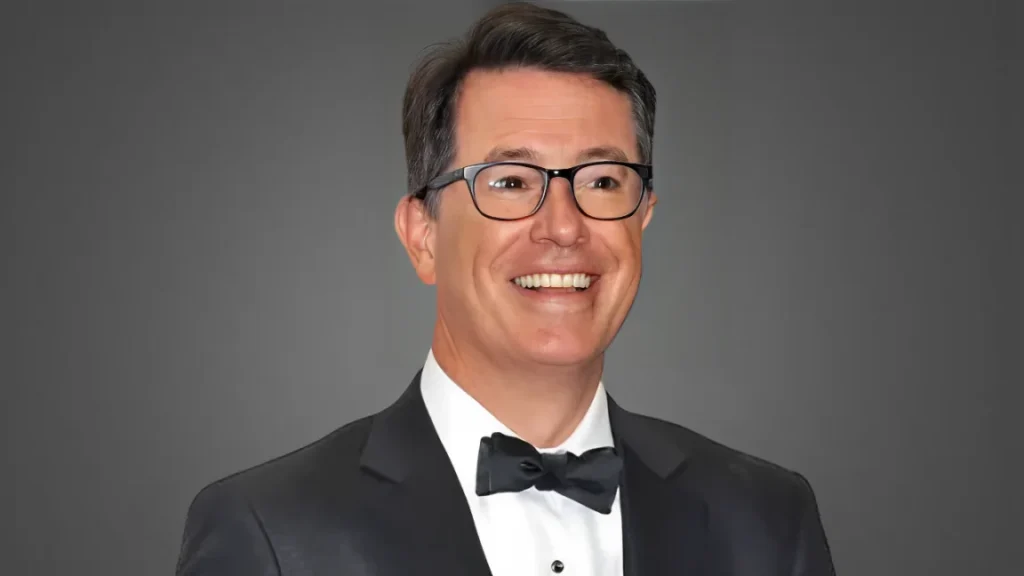Early Career: The Second City and Comedy Beginnings
After graduating from Northwestern University in the late 1980s, Colbert joined Chicago’s renowned improv group, The Second City. This was a major stepping stone, as The Second City is famous for producing many top comedians, including Tina Fey, Steve Carell, and Amy Poehler. Colbert initially started as an understudy to Steve Carell, which formed the beginning of a long professional relationship.
During his time at Second City, Colbert was introduced to writers and performers who would later shape his career. He co-created and starred in a short-lived Comedy Central show, Exit 57 (1995-1996), alongside future collaborators such as Amy Sedaris. While the show wasn’t a massive commercial success, it gained a cult following and showcased Colbert’s comedic style, which mixed absurdity with sharp satire.
Breakthrough with The Daily Show
Colbert’s major career breakthrough came in 1997 when he joined The Daily Show on Comedy Central, hosted by Craig Kilborn at the time, and later by Jon Stewart. Colbert’s work on The Daily Show as a correspondent was where he honed his ability to mix news and satire. His segments, known for his mock-conservative persona, earned him critical acclaim, as he played a clueless yet self-assured character who would often “misinterpret” or misunderstand the news stories he covered.
The rise of The Daily Show in the early 2000s coincided with a growing public appetite for political satire, particularly during the Bush administration. Colbert’s role on the show helped The Daily Show transform into a staple of political commentary. His character became so popular that it led to the next, significant phase of his career.
The Colbert Report (2005-2014)
In 2005, Colbert launched his own spin-off from The Daily Show, The Colbert Report. The show was a satirical take on personality-driven news shows, particularly mocking right-wing pundits like Bill O’Reilly. Colbert’s character on the show was a parody of a bombastic, ultra-conservative political commentator who was always confident, but often ill-informed.
The Colbert Report became a cultural phenomenon, solidifying Colbert as a key figure in American political satire. His ability to stay in character, even during serious interviews, impressed audiences. Some notable moments included his famous “The Word” segment, where he humorously dissected political and cultural issues, and his interviews with significant political figures like Barack Obama and Hillary Clinton, where he managed to blend humor with real critique.
One of Colbert’s most iconic moments was his 2006 speech at the White House Correspondents’ Dinner, where he roasted President George W. Bush and the media in front of both. While controversial, it was later seen as a defining moment in his career, showing his willingness to challenge the status quo and make bold political statements through humor.
The Colbert Report earned numerous awards, including several Emmy Awards and a Peabody Award for excellence in television.
The Late Show with Stephen Colbert (2015-Present)
In 2015, Stephen Colbert took over CBS’s The Late Show from David Letterman, marking a significant shift in his career. As the new host of The Late Show, Colbert had to move away from his satirical “Colbert” persona and adopt a more authentic version of himself for network television. This transition was initially challenging, as audiences had become so accustomed to his exaggerated character from The Colbert Report.
However, Colbert eventually found his footing as a more earnest, but still sharp political commentator. His show became a platform for dissecting the political climate in the U.S., especially during the 2016 election and Donald Trump’s presidency. Colbert’s witty commentary and incisive monologues gained him a large viewership, and The Late Show became the most-watched late-night show by 2017.
Beyond politics, Colbert also brought in diverse guests, ranging from actors and musicians to authors and philosophers, maintaining his intellectual flair. His interviews often go beyond surface-level conversation, delving into deep and sometimes philosophical discussions.
In addition to his late-night hosting duties, Stephen Colbert has effectively utilized YouTube to reach a broader and younger audience. His show’s official YouTube channel features clips from The Late Show, which regularly go viral for their sharp takes on current events. The digital content helps him stay relevant in the social media age, particularly through segments like “Meanwhile,” where he discusses offbeat news stories, and his political monologues, which continue to garner millions of views.
Colbert’s presence on YouTube is part of a broader strategy to engage viewers who consume media through non-traditional platforms. He also regularly posts behind-the-scenes content, sketches, and collaborations with other YouTubers and digital personalities, expanding his reach into the online community. His ability to transition seamlessly between television and digital platforms has been key to his continued success.

